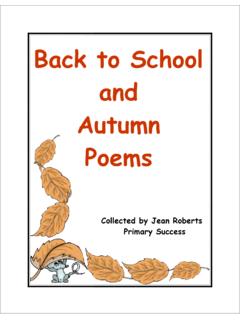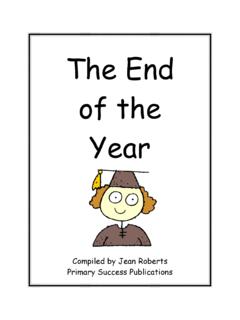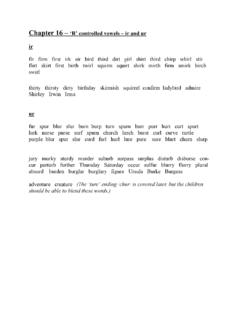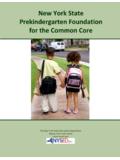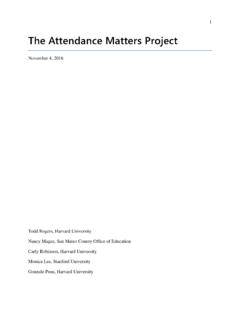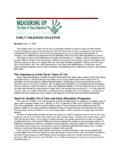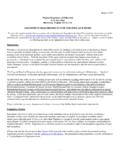Transcription of Successful Social Studies Kindergarten - Primary …
1 39 Successful Social Studies Kindergarten Practical lessons to teach Social Studies in this important grade 40 Part 1 - Welcome to School Lesson 1 - Our Page 9 Lesson 2 - Kindergarten is Great! .. 13 Lesson 3 - The People in Our Classroom .. 15 Lesson 4 - Friends .. 19 Lesson 5 - Kindergarten Rules! .. 23 Lesson 6 - Responsibilities .. 27 Lesson 7 - Taking Turns .. 29 Lesson 8 - Sharing and Cooperation .. 33 Lesson 9 - Being a Good Listener .. 35 Part 2 - Good Manners Lesson 10 - Saying Hello .. 41 Lesson 11 - Please and Thank You .. 45 Lesson 12 - Not Interrupting .. 49 Lesson 13 - Saying Excuse me .. 53 Part 3 - I Am Unique Lesson 14 - All About the Teacher .. 59 Lesson 15 - All About Me .. 63 Lesson 16 - I Look Like Me.
2 67 Lesson 17 - My Favourite Things .. 71 Lesson 18 - I Am Talented .. 75 Lesson 19 - Everyone is Different .. 79 Lesson 20 - Similarities .. 83 Lesson 21 - Important Things to Know .. 87 Lesson 22 - Personal Space .. 91 Lesson 23 - My Feelings .. 93 Lesson 24 - The Wrinkled Heart .. 97 Lesson 25 - My Five Senses .. 99 Lesson 26 - Body Parts .. 103 Lesson Index 41 Part 4 - Things We Need Lesson 27 - We Need Good Food ..Page 109 Lesson 28 - We Need a Home .. 113 Lesson 29 - We Need Water .. 117 Part 5 - Map Skills (Part 1) Lesson 30 - Directed Play .. 123 Lesson 31 - The Barnyard .. 125 Lesson 32 - The Classroom .. 127 Part 6 - The People Around Me Lesson 33 - My Family .. 133 Lesson 34 - My School Family.
3 137 Lesson 35 - Families Work Together .. 141 Lesson 36 - Families Play Together .. 139 Lesson 37 - Things Change Over Time .. 145 Lesson 38 - When I Grow Up .. 147 Part 7 - Our Community Lesson 39 - Buildings in Our Community .. 151 Lesson 40 - Places in Our Community .. 155 Lesson 41 - Helpers in Our Community .. 157 Part 8 - The Environment Lesson 42 - Land Features .. 163 Lesson 43 - Water Features .. 165 Lesson 44 - Helping Our Environment .. 167 Part 9 - Map Skills (Part 2) Lesson 45 - Map of Our Playground .. 171 Lesson 46 - Map of Our School .. 173 Part 10 - Looking Beyond Lesson 47 - Our Country .. 177 Lesson 48 - Symbols of Canada .. 181 42 Good Manners Hello, please, thank you, excuse me, I m sorry!
4 43 This subject is Social Studies , after all, and to be able to have good Social skills is very important in order to become a good citizen in Kindergarten . The lessons in this unit are just the beginning. Continue to insist that the children use good manners, and the whole class will benefit. Good manners help to teach cooperation and empathy. They also make everyone s day more pleasant and the teacher look good!! Expected Outcomes for this unit: Learn the meanings of polite and rude . Learn that it is polite to greet others and to look them in the eye. Remember to say please and thank you when asking for something. Learn that it is rude to interrupt others when they are speaking.
5 Learn when it is appropriate to say excuse me . 44 Lesson 10: Being Polite - Saying Hello Review: Discuss listening well. Discussion: Often children do not greet one another. Teaching them to do this is a great friendship boost. It raises self-esteem, especially for shy children - and it is a polite thing to do. Often we see children walk by one another or an adult they know as if the other person didn t exist or was invisible. It may be shyness, or perhaps they have no idea of what to do. Talk about this with the children. What is the polite friendly thing to do when you pass someone you know? How does it make you feel if you meet someone from your class and they don t look at you or say anything?
6 What could we do and say? Talk about saying, Hello or Hi , and then the person s name. Scatter half of the children around the room to certain spots, and the other half walk about, and as they pass one of the other children, they say, Hi, _____! and that person replies, Hi, _____! But there is Look directly at the person and smile as you meet and greet. Make sure all children are included equally. The teacher should join in, too. Praise students who look directly at the person they are meeting and smile. Look them in the eye! Talk about how this makes you feel. Why is greeting a friend this way polite? Would it be polite to just walk by? Have the children say, Hello, Ms. _____ as they come into the classroom, and you reply.
7 Do the same as the children leave the classroom after school, saying, Good-bye, _____ and they reply to you. Activity: Go out to the playground. Put the students into two groups and have each group line up. Put 4 cones out at the four compass points of a large circle. Spread one line of children on the onside of the circle, facing outwards. Send the second group one at a time to go around the outside of the circle, greeting each person on the inner circle as they move around. Then the moving group stands still and the inner circle moves around. Go outside to the playground at recess. Greet each student from your class that you meet.
8 Praise eye contact and a smile, as well as the words. See if your kiddies will greet each other. Read the poem about smiling on the next page. Make a larger copy for you to use, and memorize the words as you draw your hand under them. 45 Additional Activities: More concepts to discuss: Learn the names of the adults who work in the school, so they can be greeted, too. Learn to shake hands, too. Learn these Miss, Ms. Mrs. Mr. and when they should be used. Talk about smiling, and what it does: You can never give a smile away No matter what you do. For every time you smile at me I ll give it back to you! Verbal Vocabulary: Make sure all your students understand the words you are using especially if you have children who are not fluent in English.
9 Hello Meet Greet Miss, Ms. Mrs. Mr. Smile Eye contact 46 Smiles You can never give a smile away No matter what you do. For every time you smile at me I ll give it back to you! 47 Lesson 11: Being polite - please and thank you Review: Discuss greeting others. Discussion: Discuss the polite way of asking for something - using May I and the Thank you reply. Even better, say, Thank you, _____! using the person s name. Have a bag of small wrapped candies, some stickers or other treat. Have each child ask for one politely and then say thank you. Role play other situations. May I please go to the washroom? May I please have a drink? May I please borrow a crayon?
10 Have the students think of something to ask you for - or they can ask a friend for something. You can put the children in pairs, and they can ask politely for an object from each other. Even if a person asks politely, is the answer always going to be yes, you may ? Have the children think of times where the answer might be a no . How can you say no politely? This lesson is, of course, on-going through the year. Activity: Teach this poem/song: Good Manners (To: I'm a Little Teapot) I have good manners, yes, I do. I can say "Please," and "Thank you," too. When I m with my friends and family, too, I have good manners, yes, I do! Follow-Up Exercise: After the students have memorized the poem, give out the poem sheet.


